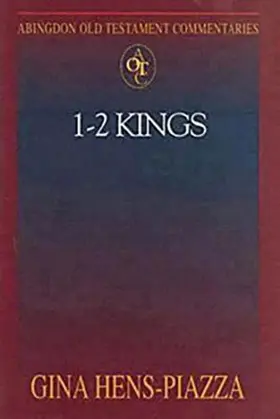

1–2 Kings
in Abingdon Old Testament Commentaries
Pages
407 pages
Publisher
Abingdon Press
Published
12/1/2006
ISBN-13
9780687490219
This study of the Books of Kings unfolds with attention and sensitivity to the immense literary artistry that craft these narratives. While setting forth the literary and theological significance of these traditions concerning the major figures in these canonical books, i.e. Israel's Kings, this commentary consistently trains our attention upon the minor characters also resident in these stories. Fixing upon these individuals as well as the prophets, the exegetical discussion often discloses how God's Word is embodied and made known by those we might least expect. While steadfastly avoiding analogical readings, the theological and ethical exposition skillfully engage the reader by amplifying the resonances in these texts echoing in our own world today.
The present volume gives an up-to-date, readable commentary on the books of 1-2 Kings. The commentary covers critical issues section by section while emphasizing the larger theological and literary issues in Kings and illustrating its relevance for modern readers.
Collections
This book appears in the following featured collections.
- Commentaries by Female Scholars by John Dyer
Reviews
Nashville: Abingdon, 2006. Pp. xx + 407. Paper. $36.00. ISBN 0687490219. Randall L. McKinion Shepherds Theological Seminary Cary, North Carolina Having read and interacted with the recent contribution of Peter J. Leithart on 1 and 2 Kings, I was eager to read and compare the work at hand. Leithart’s commentary was clearly set within the grid of understanding the theological contribution of Kings to the church. The work in the Abingdon Old Testament Commentary series on 1–2 Kings, by Gina Hens-Piazza, takes a somewhat different look at these books, in that she applies a literary approach to the text. At the same time, she attempts to derive from Kings her own theological and ethical contribution. The structure of this well-written commentary is simple. After a brief introduction that is interesting but not very comprehensive, Hens-Piazza carefully walks chapter by chapter throughout this large tome. Each chapter begins with a short introductory paragraph before commenting on the passage in three sections: literary analysis, exegetical analysis, and theological and ethical analysis. The literary analysis of each is chapter is well-done. It frames the text, gives the big picture, and delineates the narrative units. For the most part, the exegetical analyses will leave the Hebrew student and/or scholar a little disappointed, for these sections are less exegetically rigorous and more literarily focused. This does not mean that the comments are not useful, only that they make the commentary more appropriate for those students reading the English Bible.
[Full Review]
Nashville: Abingdon, 2006. Pp. xx + 407. Paper. $36.00. ISBN 0687490219. Ralph W. Klein Lutheran School of Theology at Chicago Chicago, Ilinois In a very brief introduction, the author identifies historical and literary “considerations” in the books of Kings and discusses these books as a theological work. She mentions the alternate positions of Noth and Cross on the Deuteronomistic History, without choosing between them, and the commentary itself does not really address this issue. She traces back the conditional and unconditional promises contained in the Deuteronomistic History to Moses and David, respectively. The commentary is nontechnical—no new translation, textual criticism, use of Hebrew, or footnotes—and each section (usually a chapter) is divided into “Literary Analysis,” “Exegetical Analysis,” and “Theological and Ethical Analysis.” In the segment called “Literary Analysis,” the author summarizes the section under consideration and identifies its component parts. One might have expected more detailed use of the tools of narrative criticism here. The exegetical sections will prove useful to lay readers but will provide few new insights to scholars or even seminary students (the book jacket claims the series is aimed at theological students, pastors, and upper-level college or university students).
[Full Review]
